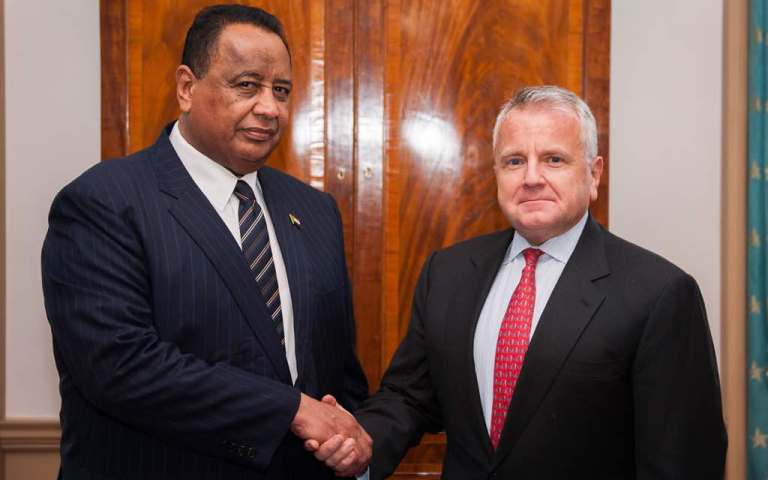Enough suggests benchmarks for Sudan’s removal from U.S. terror list

February 22, 2018 (KHARTOUM) – Before to remove Sudan from the list of States Sponsors of Terrorism, U.S. policymakers have to ensure that Khartoum is committed to the ceasefire, humanitarian access, religious freedoms but also have to verify its links with terrorist groups, advised a report released by Enough Project.
The release of the report coincided with press statements Thursday in Khartoum by Sudan’s Foreign Ministry Under-Secretary Abdel-Ghani al-Naim who announced the forthcoming resumption of talks on the normalisation of bilateral relations without giving a date.
The process is based on a five-track framework reached in December 2016 that led to the lift of economic sanctions on Sudan, but not the removal from the terror list which since the beginning has been seen as a ‘safety valve’ to ensure that Khartoum would implement political freedoms and end abuse against religious minorities, Christians particularly.
In a new report written by Suliman Balo Senior Policy Advisor at the Enough Project, the Washington-based advocacy group said the process is “dramatically ill-timed”. However, it highlights serious concerns about Sudan’s commitment to the signed deal and even went to question Khartoum’s cooperation on counterterrorism.
The report said the Sudanese government maintains alliances and policy stances that threaten U.S. interests, U.S. allies, and security in multiple regions across Africa and the Middle East.
“U.S. policymakers should seriously consider the potential threats and consequences of a softened U.S. stance with a regime that claims to fight terrorism while empowering extremist groups, including religious extremists that advocate for deadly international terrorist groups from within Sudan,” stressed the report.
The Islamist ruling National Congress Party of President Omer al-Bashir keeps professing its determination to establish an Islamic state in Sudan. Also, it turns a blind eye to the activities of rigorist groups in the country.
During a visit to Khartoum in November 2017, U.S. Deputy Secretary of State John Sullivan highlighted the need for reforms on human rights and religious freedom before to consider Sudan’s removal from the terror list.
Since the two sides have exchanged a number of notes in this respect but Khartoum has continued its repressive policies towards political leaders activists, restrictions of freedom of opinion and expression and the religious freedom.
Before to go far and consider delisting the east-African country from the terror list and support for Sudan’s debt relief, Washington should also ensure Khartoum continued commitment to the ceasefire in the Two Areas and Darfur, and to reach a humanitarian access deal with the SPLM-N, further said the report.
On the humanitarian access in South Kordofan and Blue Nile states, Enough Project says Khartoum refused to “delink humanitarian access to war-affected populations in these areas from the political track” during the latest February 2018 round of talks brokered by the African Union mediators.
Among its recommendations Enough also called to ensure that Khartoum repeals “laws and policies that drive religious discrimination against Christians as well as minority Muslim sects and practices, namely the blasphemy, apostasy, and public order laws. In addition, repeal the administrative ordinances blocking the construction of churches”.
Further, it says the process should ensure that Sudan ends support “for extremist groups that advocate for violent extremist ideologies” and ban their programmes for “the radicalization of the youth in Sudan and the recruitment of youth by some for the Islamic State and al-Qaeda”.
The report calls to include in the normalization process ways to end weapon exports and supplies to conflict countries in Africa and the Middle East, and to curb the risks of money laundering and financing of terrorism by immediately desisting from legalizing vehicles smuggled into Sudan from Libya, the Central African Republic.
Finally, the report call to engage talks on “profound political, legal, and economic reforms” through an inclusive process to “reverse Sudan’s descent into state failure”.
Washington, through the Troika mechanism, is facilitating the peace talks between the government and the armed groups but it did not take part in the national dialogue process which was held inside the country. Also, the government and some political parties said they do not want foreign involvement in the internal political process.
On 16 February Sudanese Foreign Minister Ibrahim Ghandour and Sullivan met in Germany on the sidelines of the 54th edition of the Munich Security Conference.
Following the meeting, Ghandour reiterated Sudan’s commitment to continue the implementing the five tracks and called on the US administration to continue its efforts to remove obstacles to money transfers for Sudanese banks.
(ST)
